Abstract
Most of the members of the mammalian heat-shock protein (HSP) gene family have been studied and isolated from human and mouse cells. Few studies have concentrated on the HSPs of rat, a commonly used experimental animal. We have isolated and characterized a novel inducible rat HSP70 gene using an HSP70 cDNA sequence obtained from an ischaemic rat heart cDNA library. The isolated rat HSP70 gene was found to be a functional gene, as indicated by RNAase-protection and Northern-blot analysis. The deduced amino acid sequence of the inducible rat HSP70 exhibits a high degree of similarity to previously isolated mammalian inducible HSP70 gene products. Expression of the inducible HSP70 gene in rat myogenic cells (H9c2) is markedly increased after relatively short periods of hypoxia as well as by heat shock. Two heat-shock elements (HSE) are present in the rat HSP70 promoter. Transient transfection of rat HSP70 promoter/chloramphenicol acetyltransferase constructs into H9c2 cells shows that the presence of either of the two HSEs is sufficient for heat-shock inducibility. In contrast, induction of the rat HSP70/chloramphenicol acetyltransferase constructs by hypoxia is only detectable when both HSEs are present. This leads us to conclude that the induction of HSP70 by hypoxia and heat shock occurs through the same regulatory HSEs but the activation of the inducible HSP70 gene by heat shock is several-fold higher than by hypoxia.
Full text
PDF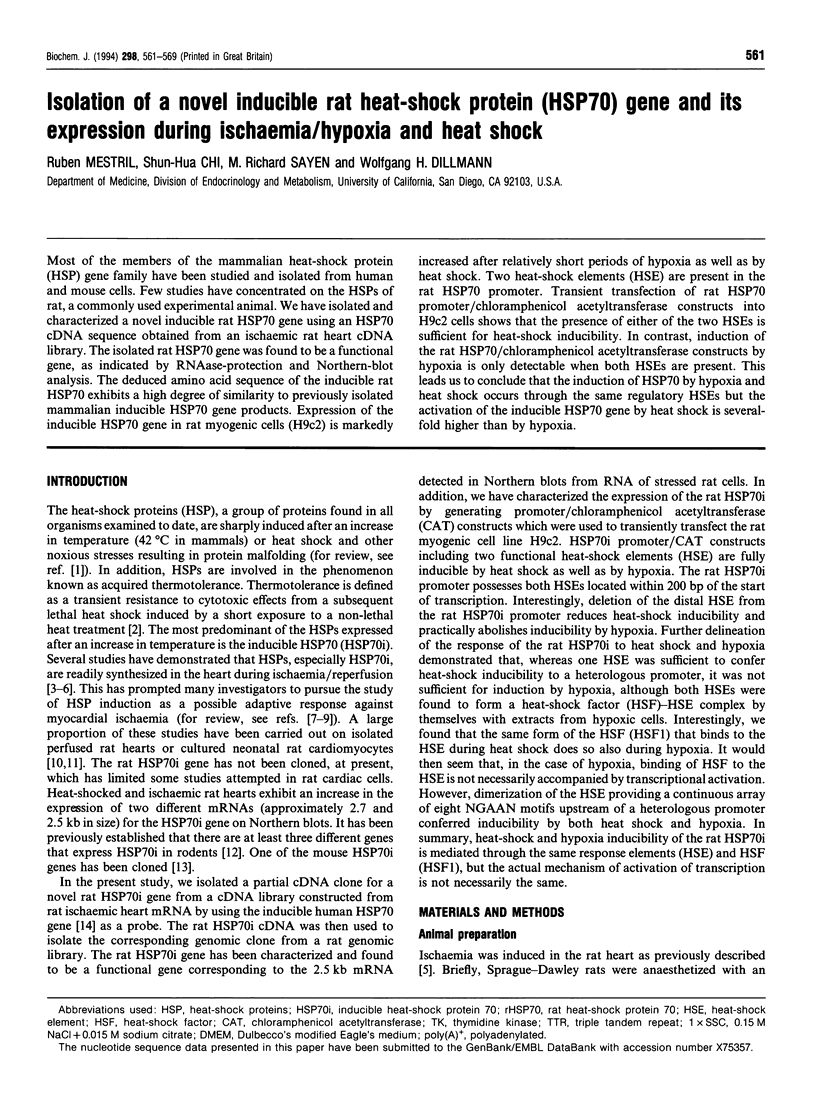
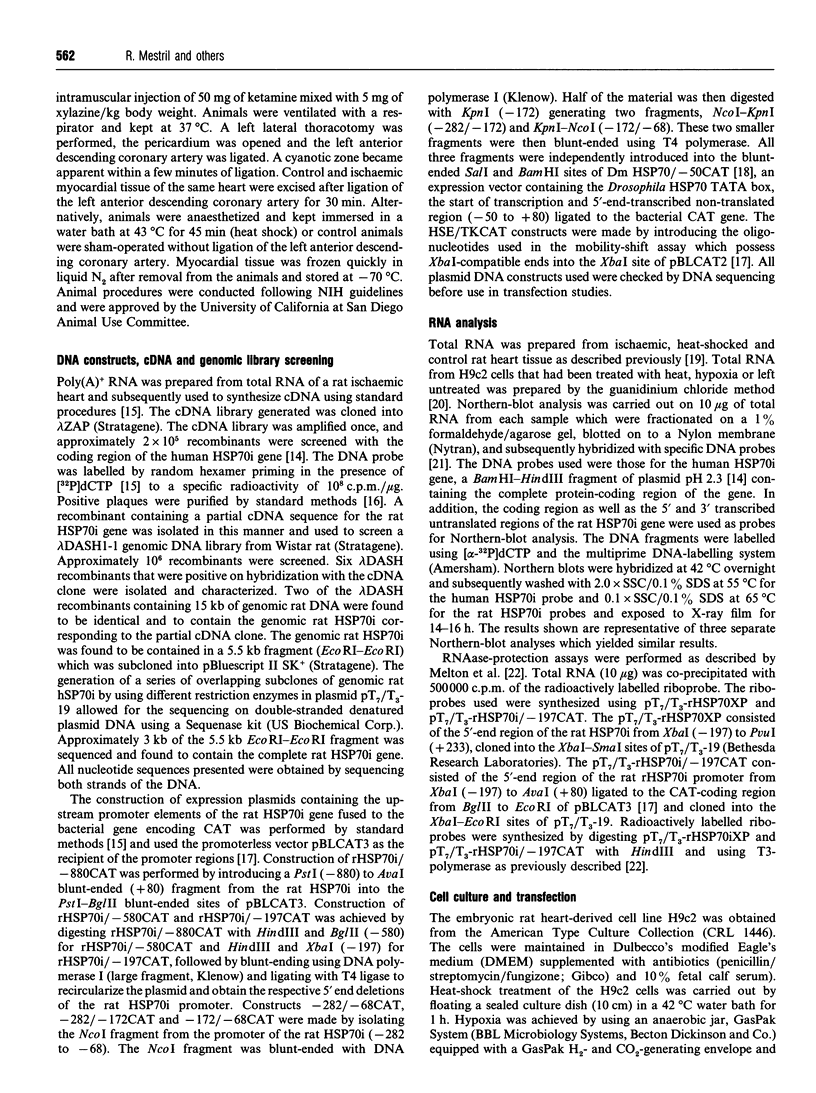
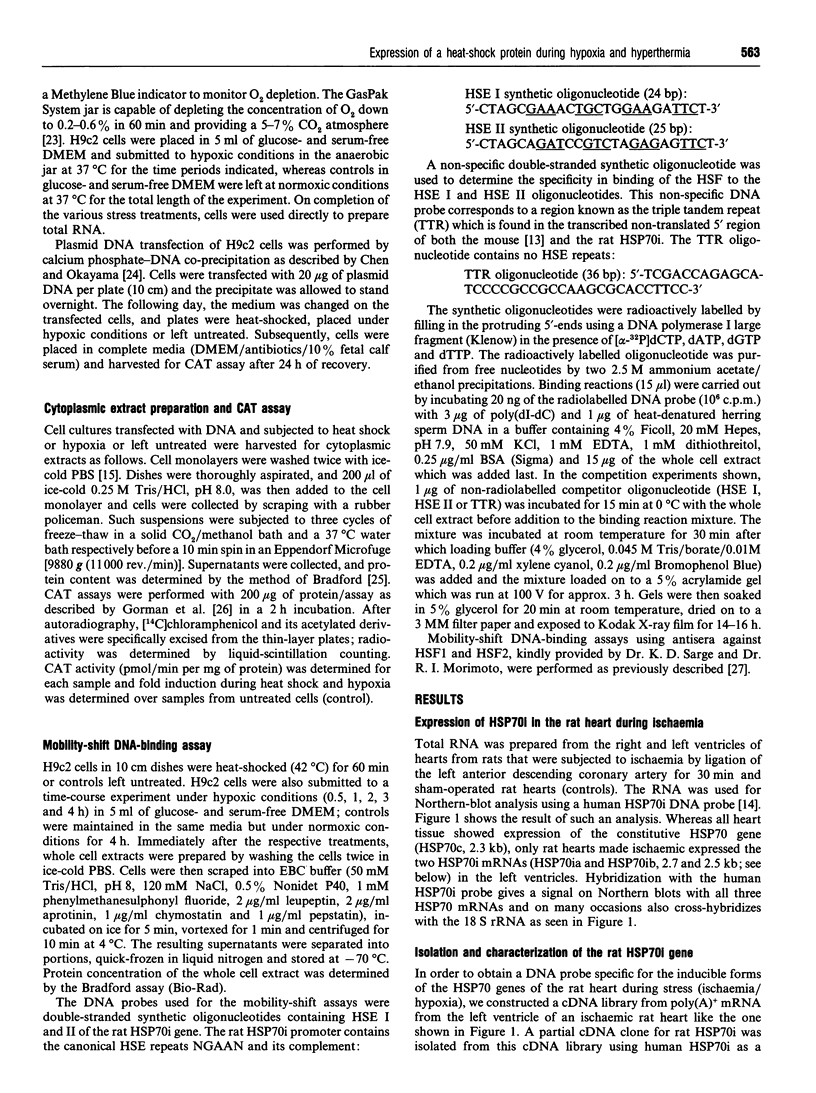
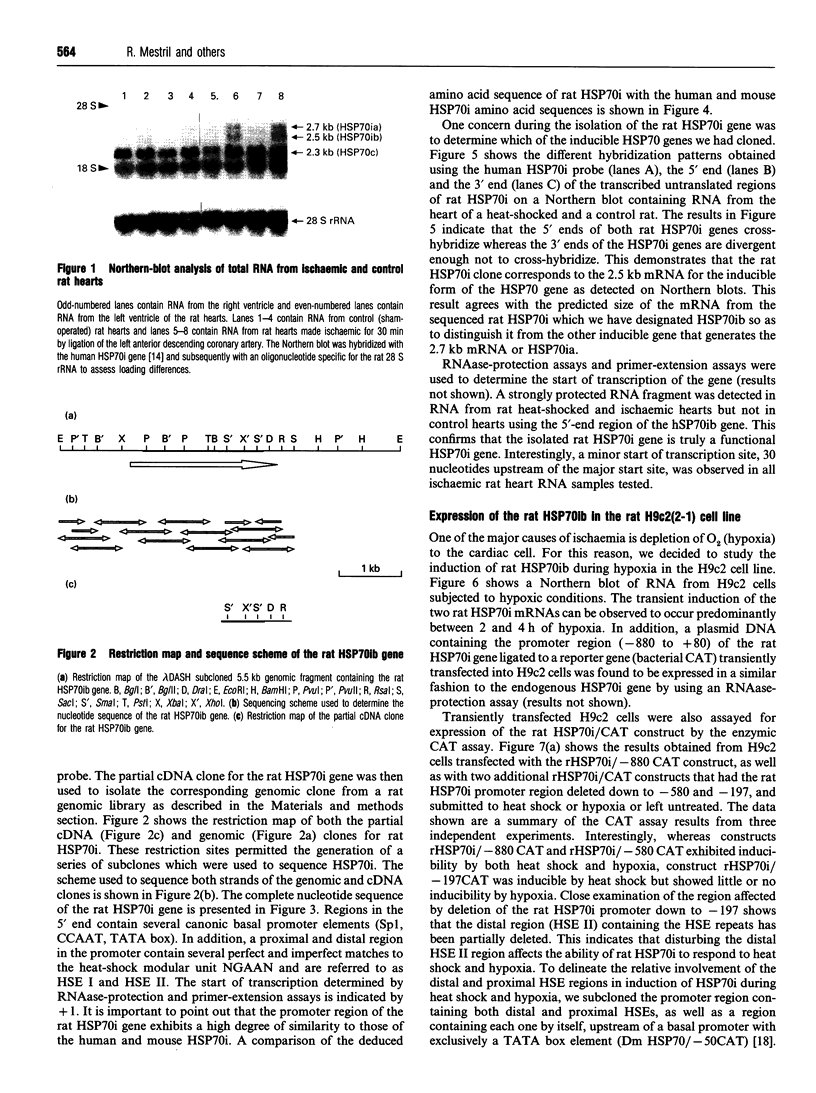
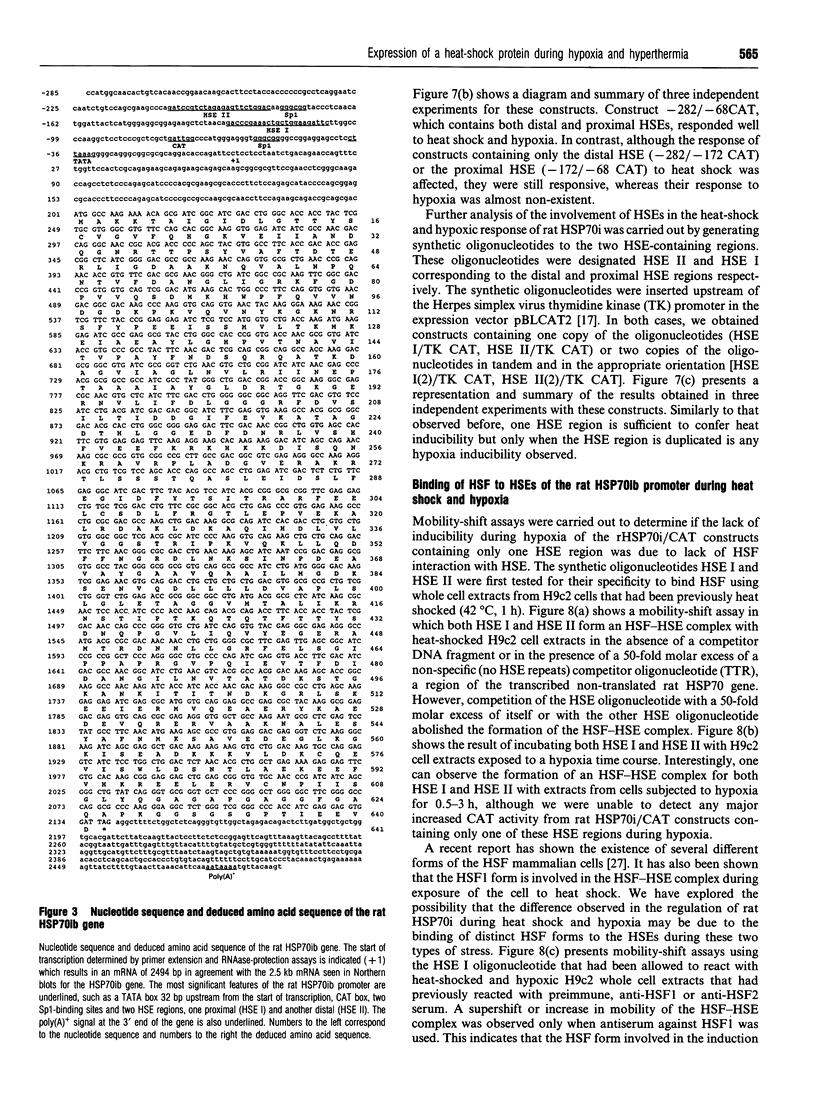
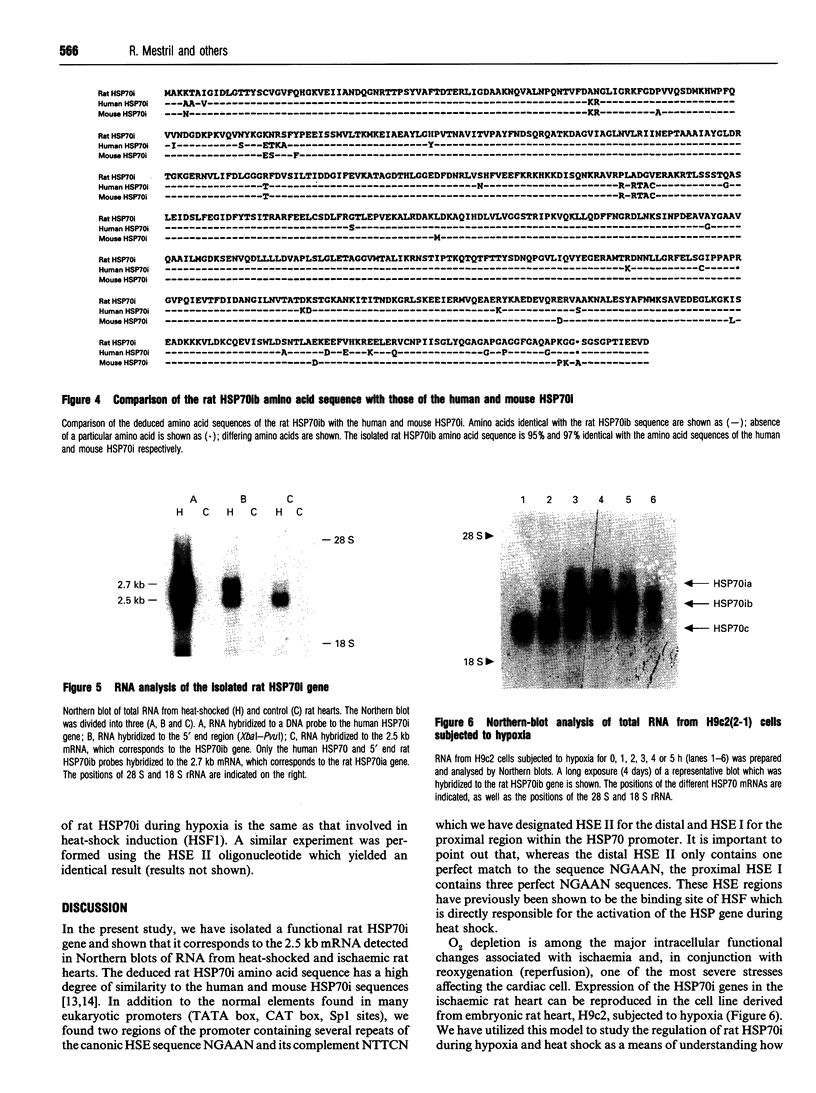
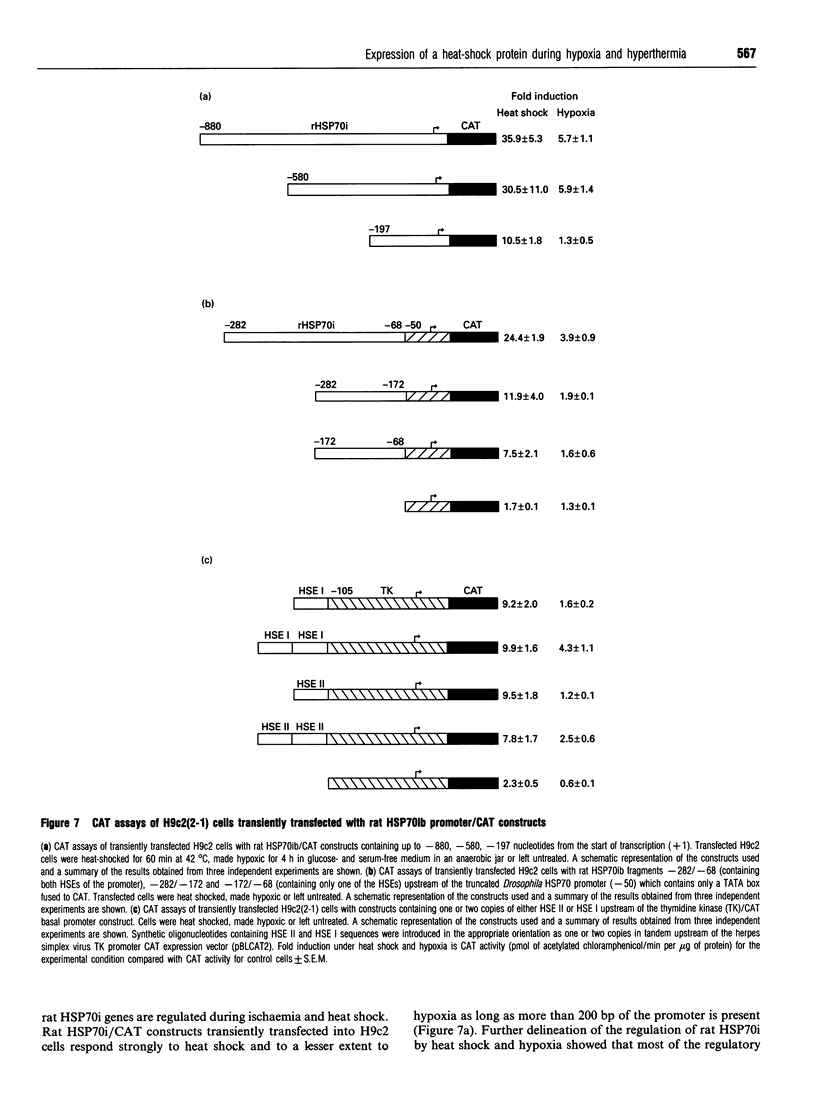
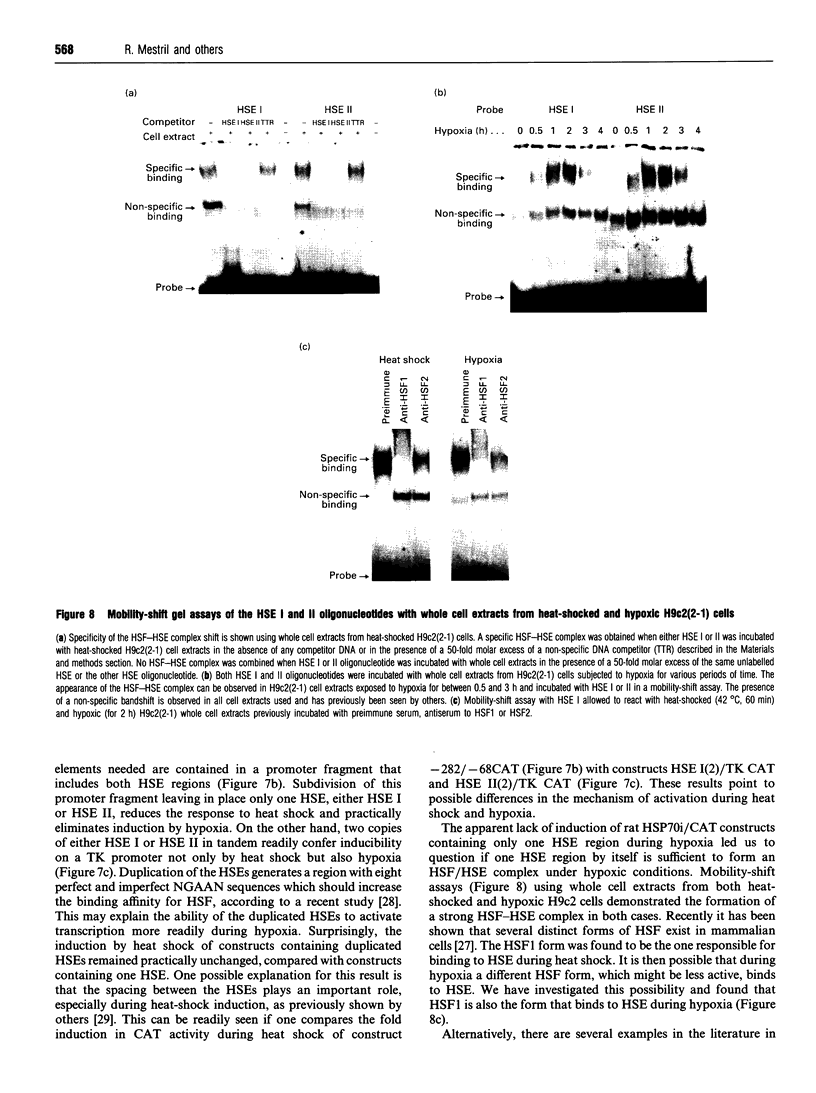
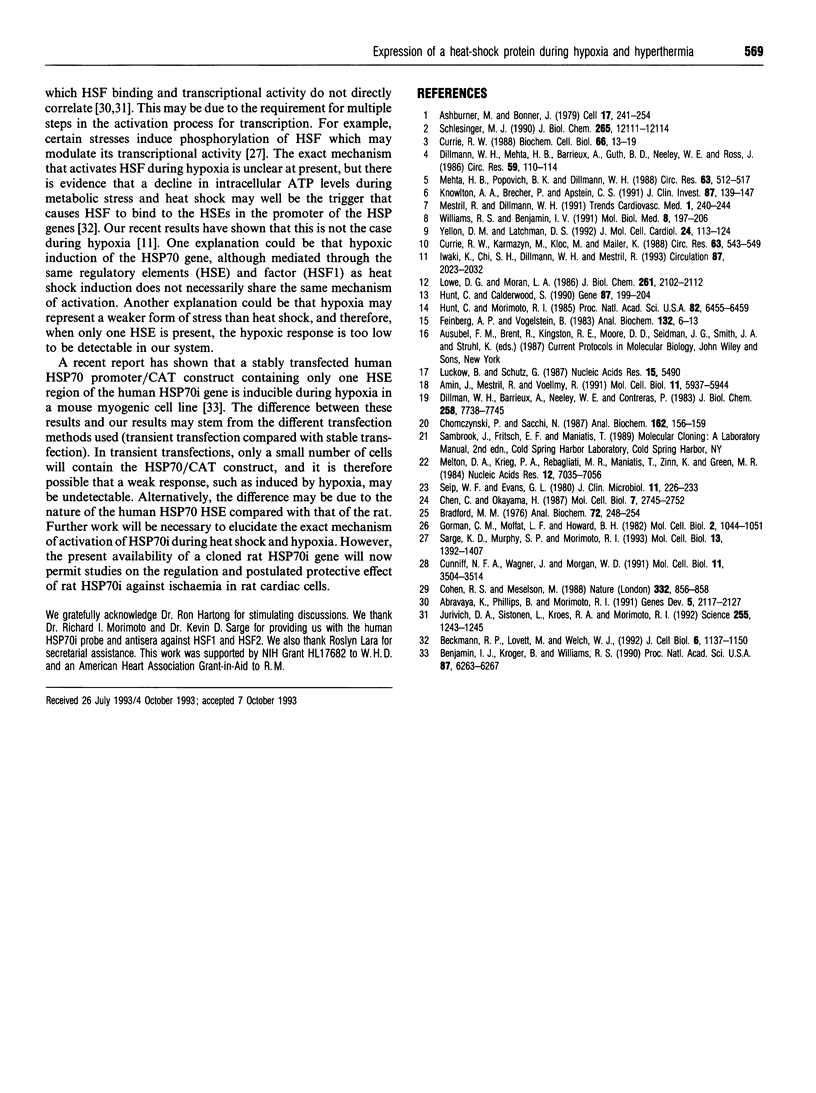
Images in this article
Selected References
These references are in PubMed. This may not be the complete list of references from this article.
- Abravaya K., Phillips B., Morimoto R. I. Attenuation of the heat shock response in HeLa cells is mediated by the release of bound heat shock transcription factor and is modulated by changes in growth and in heat shock temperatures. Genes Dev. 1991 Nov;5(11):2117–2127. doi: 10.1101/gad.5.11.2117. [DOI] [PubMed] [Google Scholar]
- Amin J., Mestril R., Voellmy R. Genes for Drosophila small heat shock proteins are regulated differently by ecdysterone. Mol Cell Biol. 1991 Dec;11(12):5937–5944. doi: 10.1128/mcb.11.12.5937. [DOI] [PMC free article] [PubMed] [Google Scholar]
- Ashburner M., Bonner J. J. The induction of gene activity in drosophilia by heat shock. Cell. 1979 Jun;17(2):241–254. doi: 10.1016/0092-8674(79)90150-8. [DOI] [PubMed] [Google Scholar]
- Beckmann R. P., Lovett M., Welch W. J. Examining the function and regulation of hsp 70 in cells subjected to metabolic stress. J Cell Biol. 1992 Jun;117(6):1137–1150. doi: 10.1083/jcb.117.6.1137. [DOI] [PMC free article] [PubMed] [Google Scholar]
- Benjamin I. J., Kröger B., Williams R. S. Activation of the heat shock transcription factor by hypoxia in mammalian cells. Proc Natl Acad Sci U S A. 1990 Aug;87(16):6263–6267. doi: 10.1073/pnas.87.16.6263. [DOI] [PMC free article] [PubMed] [Google Scholar]
- Bradford M. M. A rapid and sensitive method for the quantitation of microgram quantities of protein utilizing the principle of protein-dye binding. Anal Biochem. 1976 May 7;72:248–254. doi: 10.1006/abio.1976.9999. [DOI] [PubMed] [Google Scholar]
- Chen C., Okayama H. High-efficiency transformation of mammalian cells by plasmid DNA. Mol Cell Biol. 1987 Aug;7(8):2745–2752. doi: 10.1128/mcb.7.8.2745. [DOI] [PMC free article] [PubMed] [Google Scholar]
- Chomczynski P., Sacchi N. Single-step method of RNA isolation by acid guanidinium thiocyanate-phenol-chloroform extraction. Anal Biochem. 1987 Apr;162(1):156–159. doi: 10.1006/abio.1987.9999. [DOI] [PubMed] [Google Scholar]
- Cohen R. S., Meselson M. Periodic interactions of heat shock transcriptional elements. Nature. 1988 Apr 28;332(6167):856–858. doi: 10.1038/332856a0. [DOI] [PubMed] [Google Scholar]
- Cunniff N. F., Wagner J., Morgan W. D. Modular recognition of 5-base-pair DNA sequence motifs by human heat shock transcription factor. Mol Cell Biol. 1991 Jul;11(7):3504–3514. doi: 10.1128/mcb.11.7.3504. [DOI] [PMC free article] [PubMed] [Google Scholar]
- Currie R. W., Karmazyn M., Kloc M., Mailer K. Heat-shock response is associated with enhanced postischemic ventricular recovery. Circ Res. 1988 Sep;63(3):543–549. doi: 10.1161/01.res.63.3.543. [DOI] [PubMed] [Google Scholar]
- Currie R. W. Protein synthesis in perfused rat hearts after in vivo hyperthermia and in vitro cold ischemia. Biochem Cell Biol. 1988 Jan;66(1):13–19. doi: 10.1139/o88-002. [DOI] [PubMed] [Google Scholar]
- Dillmann W. H., Barrieux A., Neeley W. E., Contreras P. Influence of thyroid hormone on the in vitro translational activity of specific mRNAs in the rat heart. J Biol Chem. 1983 Jun 25;258(12):7738–7745. [PubMed] [Google Scholar]
- Dillmann W. H., Mehta H. B., Barrieux A., Guth B. D., Neeley W. E., Ross J., Jr Ischemia of the dog heart induces the appearance of a cardiac mRNA coding for a protein with migration characteristics similar to heat-shock/stress protein 71. Circ Res. 1986 Jul;59(1):110–114. doi: 10.1161/01.res.59.1.110. [DOI] [PubMed] [Google Scholar]
- Feinberg A. P., Vogelstein B. A technique for radiolabeling DNA restriction endonuclease fragments to high specific activity. Anal Biochem. 1983 Jul 1;132(1):6–13. doi: 10.1016/0003-2697(83)90418-9. [DOI] [PubMed] [Google Scholar]
- Gorman C. M., Moffat L. F., Howard B. H. Recombinant genomes which express chloramphenicol acetyltransferase in mammalian cells. Mol Cell Biol. 1982 Sep;2(9):1044–1051. doi: 10.1128/mcb.2.9.1044. [DOI] [PMC free article] [PubMed] [Google Scholar]
- Hunt C., Calderwood S. Characterization and sequence of a mouse hsp70 gene and its expression in mouse cell lines. Gene. 1990 Mar 15;87(2):199–204. doi: 10.1016/0378-1119(90)90302-8. [DOI] [PubMed] [Google Scholar]
- Hunt C., Morimoto R. I. Conserved features of eukaryotic hsp70 genes revealed by comparison with the nucleotide sequence of human hsp70. Proc Natl Acad Sci U S A. 1985 Oct;82(19):6455–6459. doi: 10.1073/pnas.82.19.6455. [DOI] [PMC free article] [PubMed] [Google Scholar]
- Iwaki K., Chi S. H., Dillmann W. H., Mestril R. Induction of HSP70 in cultured rat neonatal cardiomyocytes by hypoxia and metabolic stress. Circulation. 1993 Jun;87(6):2023–2032. doi: 10.1161/01.cir.87.6.2023. [DOI] [PubMed] [Google Scholar]
- Knowlton A. A., Brecher P., Apstein C. S. Rapid expression of heat shock protein in the rabbit after brief cardiac ischemia. J Clin Invest. 1991 Jan;87(1):139–147. doi: 10.1172/JCI114963. [DOI] [PMC free article] [PubMed] [Google Scholar]
- Lowe D. G., Moran L. A. Molecular cloning and analysis of DNA complementary to three mouse Mr = 68,000 heat shock protein mRNAs. J Biol Chem. 1986 Feb 15;261(5):2102–2112. [PubMed] [Google Scholar]
- Luckow B., Schütz G. CAT constructions with multiple unique restriction sites for the functional analysis of eukaryotic promoters and regulatory elements. Nucleic Acids Res. 1987 Jul 10;15(13):5490–5490. doi: 10.1093/nar/15.13.5490. [DOI] [PMC free article] [PubMed] [Google Scholar]
- Mehta H. B., Popovich B. K., Dillmann W. H. Ischemia induces changes in the level of mRNAs coding for stress protein 71 and creatine kinase M. Circ Res. 1988 Sep;63(3):512–517. doi: 10.1161/01.res.63.3.512. [DOI] [PubMed] [Google Scholar]
- Melton D. A., Krieg P. A., Rebagliati M. R., Maniatis T., Zinn K., Green M. R. Efficient in vitro synthesis of biologically active RNA and RNA hybridization probes from plasmids containing a bacteriophage SP6 promoter. Nucleic Acids Res. 1984 Sep 25;12(18):7035–7056. doi: 10.1093/nar/12.18.7035. [DOI] [PMC free article] [PubMed] [Google Scholar]
- Schlesinger M. J. Heat shock proteins. J Biol Chem. 1990 Jul 25;265(21):12111–12114. [PubMed] [Google Scholar]
- Seip W. F., Evans G. L. Atmospheric analysis and redox potentials of culture media in the GasPak System. J Clin Microbiol. 1980 Mar;11(3):226–233. doi: 10.1128/jcm.11.3.226-233.1980. [DOI] [PMC free article] [PubMed] [Google Scholar]
- Williams R. S., Benjamin I. J. Stress proteins and cardiovascular disease. Mol Biol Med. 1991 Apr;8(2):197–206. [PubMed] [Google Scholar]
- Yellon D. M., Latchman D. S. Stress proteins and myocardial protection. J Mol Cell Cardiol. 1992 Feb;24(2):113–124. doi: 10.1016/0022-2828(92)93148-d. [DOI] [PubMed] [Google Scholar]






